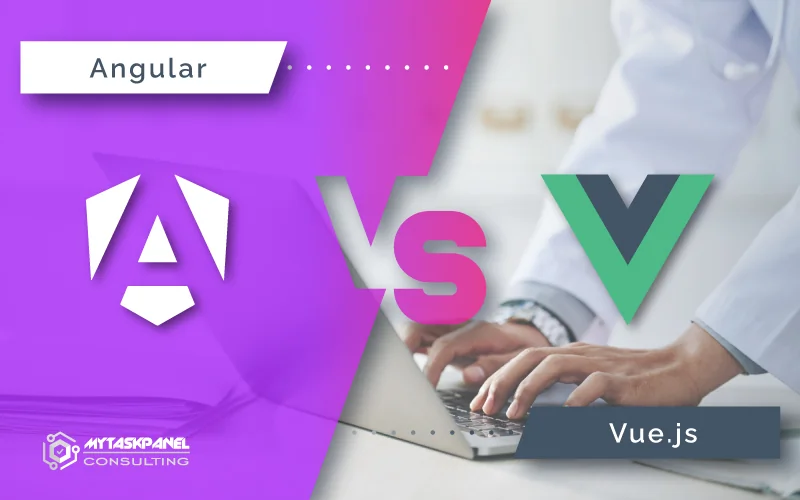Choosing the appropriate framework can make a significant difference in the success of a project. Angular and Vue.js are two of the most popular and widely used front-end frameworks today. Both offer powerful features and have active developer communities. However, which one is the most suitable for your project? Angular or Vue.js? In this article, we will explore what they are, their benefits and drawbacks, when to use them, and when it is better to avoid them.
What is Angular?
Angular is a front-end framework developed and maintained by Google. It uses TypeScript as its primary programming language and follows the MVC (Model-View-Controller) design pattern. Angular provides a comprehensive set of tools for building complex and scalable Single Page Applications (SPAs).
Benefits:
- Structure and organization. Angular provides a clear structure and organization for the code, which facilitates maintenance and scalability of applications.
- TypeScript. The use of TypeScript in Angular allows for static typing, which helps detect errors at compile-time and improves code robustness.
- Angular CLI. Angular CLI (Command Line Interface) is a powerful tool that simplifies the creation, development, and deployment of Angular applications.
Drawbacks:
- Learning curve. Angular has a steeper learning curve due to its complexity and the number of features.
- Performance. Compared to other frameworks like Vue.js, Angular can be less efficient in terms of performance due to its more complex architecture.
What is Vue.js?
Vue.js is a progressive, open-source front-end framework developed by Evan You. Unlike Angular, Vue.js is more flexible and easier to integrate into existing projects. It uses pure JavaScript and is known for its simplicity and ease of use.
Benefits:
- Simplicity and flexibility. Vue.js is easy to learn and use, making it ideal for small to medium-sized projects.
- Reactivity. It uses a reactivity system that automatically updates the user interface when data changes.
- Components. It is based on a system of reusable components that simplify the construction and maintenance of complex user interfaces.
Drawbacks:
- Scalability. Although Vue.js is suitable for small to medium-sized projects, it may face scalability challenges in large and complex projects.
- Smaller community and resources. Although Vue.js has a growing community, it is not as large or well-established as the Angular community.
When to use Angular?
- Large and complex projects. Angular is recommended for large and complex projects that require clear structure and organization.
- Enterprise applications. Due to its robustness and advanced features, Angular is an excellent choice for developing scalable and maintainable enterprise applications.
When to use Vue.js?
- Small and medium-sized projects. Vue.js is perfect for smaller and medium-sized projects where simplicity and flexibility are priorities.
- Prototypes and MVPs (Minimum Viable Products). Due to its rapid development, Vue.js is a good alternative for quickly and efficiently creating prototypes and MVPs.
When to avoid Angular or Vue.js?
- Projects with extreme performance requirements. If your project requires extremely high and efficient performance, you might want to consider other more optimized frameworks like React.
- Inexperienced team. If your team lacks prior experience with Angular or Vue.js, it might be better to opt for a simpler and easier-to-learn framework to avoid the learning curve.
Both Angular and Vue.js are powerful and versatile front-end frameworks with their own strengths and weaknesses. The choice between Angular and Vue.js will depend on the specific needs of your project, team size, experience, and performance requirements. If you are looking for a robust and scalable solution for large and complex projects, Angular might be the best option. On the other hand, if you prioritize simplicity, flexibility, and rapid development, Vue.js might be more suitable for your needs. Ultimately, it is important to carefully evaluate your requirements and consider the advantages and disadvantages of each framework before making a decision.










